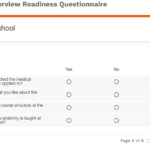How to Smash the Medical School MMI Interview – Questions Answered
Unlike traditional interviews, Medical School Interviews are assessing your passion for medicine and future potential rather than just your knowledge and experience. Multiple Mini Interviews (MMI Interviews) is a particular structure used by many universities and although there are still a few medical school using the traditional panel interview, these are becoming much less common. The medical school admissions process aims to assess a candidate’s suitability for a career in medicine to ensure only suitable candidates who are most likely to complete the course in medicine will be accepted. Practicing MMI Interviews is an essential exercise and should focus on MMI questions which are more focused and direct than traditional interview questions. Each mini-interview is on a different topic and with different people who specialize in a particular area. It’s a good idea to check your readiness using our online medical school interview checklist – click here – it provides a free report on where improvements are required.
The MMI interview format has been proven by research to produce better candidates and consists of several (6-10) mini interviews of between 5-10 minutes each. It was designed and developed by McMaster University and over the years many medical schools have used the MMI approach to improve the fairness of the admission process, providing a more structured assessment of potential medical students and their non-academic abilities. Traditional panel interviews are known to create a greater bias during assessment since a range of independent perspectives towards a candidate is not taken but rather a panel of interviewers will base their decision across an entire interview which may be impacted by a single bad response. By taking an average score across a number of independent MMI stations medical schools are better able to assess candidates.

What is the structure of an MMI Interview?
- Many universities structure MMI interviews as 6-10 interview stations with each station focusing on a different topic or question that you will be given before you enter.
- You generally get a minute or two to prepare – the station itself can last anywhere from 5 to 10 minutes. Having multiple mini interviews with multiple interviewers provides candidates with an opportunity to create “multiple first-time impressions”.
- Entering a new room/station, is a new start and a new door to do better without performance in previous rooms having any bearing on the discussions on scoring for this MMI station.
- The MMI Interview is intended to gauge proficiency in skills such as communication, non-verbal cues, social interaction, and teamwork. After the interviews, scores for each station and skill being measured reflect a candidates overall suitability but also indicate how a candidate will interact with the patients and colleagues as a doctor/physician.

- During medical school panel interviews many questions are posed from different members of the panel and each panel member will be assessing the interviewee from their own perspective and assessing the candidate even when the question raised isn’t their particular strength. Performance will be judged by consensus and is prone to varying degrees of bias.
Why do universities use MMI Interviews ?
The MMI Interview evaluates both verbal and non-verbal communication skills of a student along with the areas related directly to the medical profession. Just like any other interview, the MMI interview approach facilitates the selection of only those who are most likely to succeed in the role or course offered. Research on MMIs shows that medical school interviews using an MMI format generate a more trustworthy and unbiased assessment of candidates.
The candidate gets multiple opportunities to make a “first impression” since each station is manned by a different interviewer. A poor performance on one station will not impact the next station which is especially important since in a traditional interview the interviewer will naturally consider poor performance on a previous question. Each station poses a different question or scenario which will help the interviewer assess different attributes of the candidate; motivation, emotional intelligence, communication skills etc.. Some medical schools during MMI interviews focus more on critical thinking while the others concentrate on current events, or emphasize role-playing.
What are are the different MMI stations in the MMI Interview?
MMI stations of every medical school vary depending upon the skills and abilities they want to assess during that particular year; but there are some common MMI stations that you are more likely to come across. The content of each MMI station is reviewed by the team and assessment models are created to allow the faculty members doing the interviews to easily and consistently assess individuals. The team may include the chairperson, dean or head of the department, advisors and consultants, and / or professors and lecturers in the appropriate fields.
It is not necessary that each station is on a medical-related topics, on the contrary, it will be an assortment of scenarios to understand how you think in different situations. MMI stations may includes scenarios to assess ethical decision-making, problem-solving, working as a team, integrity and motivational, etc..
Role-play Station
This type of MMI station is also called the MMI acting station where you have to take on the role of one of the individuals in a given scenario such as; breaking bad news, explaining test results, or any other situation requiring empathy.
Professional Station
This type of interview will also be a role play with an actor but here you have to be in a situation where your expertise or professional judgment is required in a very time-pressured environment. Your decision-making skills are key and in all circumstances your own well-being and the safety of the patient should be prioritised.
Prioritization Station
Here you will be assessed for your aptitude in determining which factors you use to establish a priority order for conflicting demands. You will be given a situation like recording the medical history of 10 patients or giving out medical appointments and expected to come up with a prioritized response basing on some sort of rationale.
Giving Instructions Station
Here you will be asked to give instructions about an everyday task such as tying a shoelace or making the tea. The key here is to not go into too high level or too low level.
Calculations / Data Station
This station will ask you to calculate the drug doses for any patient seeing their weight and height or any other simple calculation or any simple interpretation of data.
How to Answer Questions in an MMI Interview?
The following steps will help to frame a coherent and apt answer to each of the MMI questions:
Understand and Synthesize Your MMI Response
It is pertinent that the examiner’s question is not summarized and restated again. You should display appropriate understanding by synthesizing the opening statement with an informative insight. You may relate to some ethical issues, current situations, or even personal examples. It should convince the interviewers that you not only comprehended the problem but possess the suitable intellect to offer a valid insight as well.
Clarify the Context of Your MMI Response
The assumptions must be correctly contemplated and articulated to develop an informed decision. Moreover, the issue should be assessed in totality, weighing both sides to the problem and explore multiple options for the resolution. This exercise will depict your critical thinking abilities and skills.
Empathize with the Subjects in the MMI Question
An all-encompassing approach is very essential. You must convey your ability to visualize and assess all angles to a scenario. This would entail getting into the shoes of each hypothetical character’s situation to comprehend his background and point of concern.
Get Ethical During your MMI Answer
Keep the attention focused on the scenario and identify/ name the conflict properly. You may not refer to the technical jargon, just give out a clear statement of the internal conflict being sensed and sought in answering.
Conclude Your MMI Station Appropriately
A calculated and precise conclusion sums up the argument being presented logically. Ensure you spell out the course of action, o not leave the interviewer guessing about it. Mark the impression that you possess the ability to make a decision and can act according to the established conventions.
What are the different types of MMI Questions?
There are 6 different types of MMI questions. Each category will be discussed in this section.
Scenario Type Questions
You will be given an imaginary situation and a hypothetical role to play. The situations or the problems can be of any sort either to break bad news or deal with conflict. You will be assessed on your response and actions towards that situation and how critically you think. Your flexibility, thoughtfulness, willingness, ethical boundaries, and general knowledge will be evaluated.
Acting Type Questions
These are similar to scenario-type questions where an actor awaits in the room with a situation. These situations are a generally difficult ones. The actor may not be directly addressing you, however, you need to remain attentive and alive to the situation. Grasp the necessary instructions and modulate the response.
Writing Type of Questions
Although the major segment of MMI questions is the verbal response to the interviewer there can be some questions where you might be asked to write your answer.
Policy Type Questions
Your opinions about the current problems and issues will be assessed. The problems and issues may pertain to the field of medicine, pharmaceuticals, dentistry, or any other associated field of medicine. You never know, the greater social hot topics discussed on the news can also be added to the list.
Personal Type of Questions
You will be asked about your personal self. You will have to confront your strength and weaknesses. It will challenge your intuition as to why you want to become a doctor? have you faced a conflict? have you ever resolved a conflict? It’s important to stick to integrity and explains whatever lessons have you learned from this situation.
Collaborative Type Questions
As the name reflects it involves teamwork as a major tool. You might be asked to solve something as a team, solve an issue, help the interviewer or any other member present, copy any picture or any structure or help your team draw something by instruction.
What are the common mistakes when answering MMI Questions?
The worse thing you can do is memorise and practice the answers of specific questions (which may or may not come up) and sound robotic and rehearsed – best to use bullet points even during your practice. Other areas which you need to keep in mind are:
- Shaky Start. Avoiding the Introduction or small talk, may not be a deciding factor but contribute to a diminishing confidence level. It adds a personal touch once you approach a station with a smile, introduce yourself, and utter a pleasantry. It establishes an aura of confidence and sets a positive mood for your impending conversation.
- Seeking Approval. Anticipating approval or a nod from the interviewer to support your answer or understanding of a scenario represents a lack of confidence in your own understanding.
- Generic Arguments. Some questions are generic and philosophical in nature. Lack of knowledge, incorrect articulation, and incoherent assumptions may lead to hasty, incomplete, and juggling answers. It tantamount to a lack of confidence.
- Eye Contact. Avoiding eye contact and looking down while answering questions reinforces the perception of lacking confidence.
- Wobbly End. Abruptly finishing the sentence and rushing towards the door once the session termination bell is sounded, corresponds to an impulsive and impatient nature.
- One-Sided Argument. Inconsistent and rash thinking process leads to sudden and inadequate logical conclusions. Thus a candidate responds without weighing the complete picture and bases his answer on the one-sided story. Thus giving a flaccid and incoherent response.
- Zoomed In Approach. The candidate focuses on the selected person only rather than contemplating the entire scenario in totality. Thus responses lack pivotal cost-benefit analysis in totality.
- Verbosity and Not Answering the Question. The candidate tries to impress the interviewer with superfluous terminologies and knowledge. It leads him astray from the subject matter. Moreover, a candidate tends to beat about the bush in case he lacks requisite knowledge about the context. Both scenarios cast a negative impression.
- Talking Too Much. Candidates tend to believe that they have to capitalize upon, entire 6 – 8 minutes time span allotted at a specific station. Therefore they endeavor to impress upon unnecessary prolonged arguments, leading to unwinding opinions and sweeping statements lacking sufficient grounds.
- Not Listening. Anticipating the question or action without letting the interviewer conclude or listening to a character in the scenario, leads to incorrect delivery of response action.
- Being Uncomfortable With Silence. Babbling a filler to make up for the silence in case there are no follow-up questions, proves detrimental.
- Distractions. Doing your interview in a place with lots of distractions or noise in the background.







